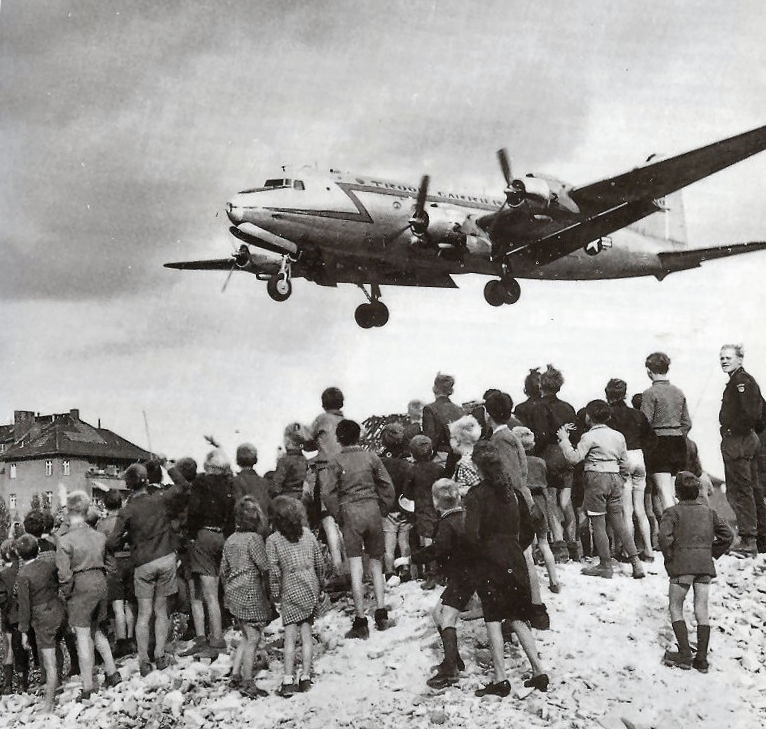
Love is In the Air
Published in Accountability, Event, LeadershipCountering Fear, Repression & Isolation
The New Year had barely begun when Russian military forces launched their bold offensive against the enemy.
Russian soldiers barreled across the border in an operation described as a liberation.
Resistance to the Russian onslaught was stiff, yet the Red Army held a five-to-one advantage in terms of personnel, equipment and materiel. The march toward victory was costly for the Russians but their attack was relentless.
The target of the Russian aggression? Crimea? Ukraine? Berlin. 1945.
The Russians were on our side back then. In hindsight, the alliance can be seen more clearly for what it really was: a marriage of convenience. Those fighting on the same side during World War II didn’t always like one another, it’s just that everyone hated the Nazis more.
Following Germany’s surrender, the U.S., Great Britain, France and Russia divided Germany into four zones, and Germany’s capital—Berlin—into four sectors. East Berlin was controlled by the Russians, while West Berlin was controlled by the other three allies. Berlin posed a special set of challenges because the city is situated deep in the eastern side of the country, which the Russians controlled.
Russia’s alliance with Britain, France and especially the United States grew increasingly uneasy.
Within eight weeks, the Russians had tightened their grip on Berlin.
And when the Allies substituted new Deutsche Marks for Reichsmarks in June 1948, the Russians retaliated.
On June 24, 1948, the Russians blocked the Western Allies’ railway, road and canal access to the sectors of Berlin under Western control. The Soviets offered to drop the blockade if the Western Allies withdrew the newly introduced Deutsche Mark from West Berlin.
Unwilling to bow to the Communist threats and despite aggressive Soviet interference, the Allies began airlifting tons of supplies for isolated Berliners two days later.
The Cold War had begun. And the Berlin Blockade marked the first test of America’s resolve.
This month marks the 75th anniversary of the Berlin Airlift.

Fear is a powerful motivator and Josef Stalin ruled by fear. But maintaining a state of fear is costly and, over the long term, ineffective: Fear breeds suspicion, smothers creativity, and requires relentless enforcement. Fear will drive away the people you value the most.
Leadership is inspiring human behavior.
Ask: Does my leadership style compel or inspire behavior?
“History doesn’t repeat itself, but it rhymes.”
Depending on whether you attribute this aphorism to Mark Twain (the most common and most mistaken citing) or Austrian psychotherapist Theodor Reik (the most likely source of the quote), the idea holds that over the course of time there are recurring cycles of events with some variations. Smart leaders search history for lessons.
Today, most of the world watches in horror as Russia’s “special operation” in Ukraine devastates the country. Russian soldiers and mercenaries are leaving a swath of death, casualties, rubble and humanitarian atrocities in their wake.
In post-World War II Germany, the country was in ruins. About two-and-a-half million Berliners found themselves soundly defeated, increasingly isolated and searching desperately for food and shelter.
Tragic events can inspire noble responses, and the Berlin Airlift is one of the largest humanitarian aid missions in history.
Despite aggressive Soviet interference, American and British air forces completed more than a quarter-million airlifts over Berlin, delivering tons of food and fuel for isolated Berliners. The original plan called for lifting 3,475 tons of supplies daily. By the spring of 1949, that number was often met twofold, with the peak daily delivery totaling 12,941 tons.
At the height of the Berlin Airlift, one plane reached West Berlin every thirty seconds.
One of those planes was flown by Gail S. Halvorsen, a twenty-seven-year-old lieutenant in the U.S Air Force who observed first-hand the living conditions of children in Berlin. He wanted to help.
His help initially took the form of distributing gum and candy from his ration pack. Then he got the idea to attach handkerchief parachutes to chocolate bars and drop them from his aircraft to the children below.
Halvorsen became known as The Candy Bomber.
By the end of the Berlin airlift in 1949, twenty-five crews had dropped twenty-three tons of chocolate, chewing gum and other candies over Berlin.
“The idea of helping one another,” said Halvorsen, “is stronger than the feelings of anger – if you just nurture it.”
Check out this two-minute video courtesy of the U.S. Department of Defense.

Ask: Where can I be a force for good?
Contact Greg Bustin today to schedule your free leadership consultation.
Ready to reset?
Attend my free Accountability webinar: I Did It! to set and achieve your 2021 goals.
- February 17th from 11 AM – 12:30 PM Central Time
- My free webinar will help you:
– Sharpen your personal goals
– Improve time management
– Tackle tough work-related issues
– Support remote workers
Learn More
To dive even deeper into the topic of accountability, I invite you to purchase a copy of my bestselling book, “Accountability: The Key to Driving a High-Performance Culture.”
Become a better leader.
Download my three free e-books.
Free Tips
Sign up to receive free tips on business, leadership, and life.
Get My Latest Book
HOW LEADERS DECIDE
History has much to offer today’s current and aspiring leaders.
Business schools teach case studies. Hollywood blockbusters are inspired by true events.
Exceptional leaders are students of history. Decision-making comes with the territory.



